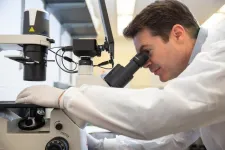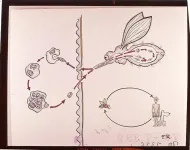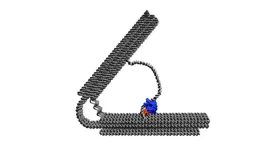Imprinted genes in the ‘parenting hub’ of the brain determine if mice are good parents
Study identifies Magel2, a novel imprinted gene that affects nesting behavior
2023-10-19
(Press-News.org) Whether a mouse is a good or bad parent can be traced back to imprinted genes in key neurons in the “parenting hub” in the brain, according to a new study by Anthony Isles of Cardiff University and colleagues, published October 19 in the journal PLOS Genetics.
In mice, there is some evidence that an unusual phenomenon in mammals called genomic imprinting impacts parenting behavior. Mammals inherit two copies of each gene – one from each parent – and usually, each copy is expressed equally in the cell. With imprinted genes, however, only one copy is expressed, either the one inherited from the father or the mother. To confirm that imprinted genes play a role in parenting, Isles’ team used sequencing data from neurons in the parenting hub in the hypothalamus of mice. They found that imprinted genes are especially common among the genes expressed in these cells, including Magel2, a novel imprinted gene that was not previously linked to parenting. Further experiments showed that mice lacking an active form of Magel2 were inattentive parents that made subpar nests.
The new findings show that genomic imprinting plays an important role in controlling parenting behavior in mice. Interestingly, previous research has shown that if mouse pups lose the paternal version of Magel2, they make fewer ultrasonic vocalizations, which they use to get their mother’s attention. Together, these results support the idea that genomic imprinting has evolved to coordinate parenting activities between a mother and her pups.
The authors add: "Our study demonstrates the importance of imprinted genes as a group in neural circuitry that controls parenting behavior in mammals. These findings imply that the maternal and paternal genomes may differentially manipulate parental care for their own ends, and thus shaping the evolution of parenting behavior in mammals."
#####
In your coverage, please use this URL to provide access to the freely available article in PLOS Genetics:
http://journals.plos.org/plosgenetics/article?id=10.1371/journal.pgen.1010961
Citation: Higgs MJ, Webberley AE, Allan AJ, Talat M, John RM, Isles AR (2023) The parenting hub of the hypothalamus is a focus of imprinted gene action. PLoS Genet 19(10): e1010961. https://doi.org/10.1371/journal.pgen.1010961
Author Countries: UK
Funding: This work was supported by a Wellcome Trust PhD studentship (220090/Z/20/Z) to ARI, MJH and RMJ. Furthermore, we are extremely grateful to the Foundation for Prader-Willi Research with the Mary Lyon Centre, International Facility for Mouse Genetics, at MRC Harwell for generating the mouse model and producing the experimental cohorts used in this study (MC_UP_2201/1). The funders had no role in study design, data collection and analysis, decision to publish, or preparation of the manuscript.
END
ELSE PRESS RELEASES FROM THIS DATE:
2023-10-19
With smartphone videos, clinicians can analyze human movement using open source "OpenCap" platform, 25x faster and at a fraction of the cost of labs.
####
Article URL: https://journals.plos.org/ploscompbiol/article?id=10.1371/journal.pcbi.101XXXX
Article Title: OpenCap: Human movement dynamics from smartphone videos
Author Countries: US
Funding: SDU, AF, LK, JM, ASC, JLH, and SLD were supported by the National Institutes of Health (https://www.nih.gov; grant 1P41EB027060-01A1) and the Wu Tsai Human Performance Alliance (https://humanperformancealliance.org). ASC and MK were supported by Philips Healthcare (https://www.usa.philips.com/healthcare) ...
2023-10-19
WHAT:
A research team funded by the National Institutes of Health has developed a smart phone app that can track and analyze a person’s ability to move from one place to another, known as locomotion, and other types of movements. Human motion analysis is used to evaluate patients with movement difficulties, to help clinicians plan surgery, and to assess the results of treatment procedures. The research team believes that using the app costs about 1% of conventional motion analysis techniques and works 25 times faster. The study appears in PLOS Computational Biology.
Researchers tested their app, called OpenCap, with 100 participants. Using two or more smart phones, ...
2023-10-19
Researchers from North Carolina State University have pinpointed a particular peptide’s role in activating atopic dermatitis, or eczema. The work could lead to more effective treatments for the condition.
Atopic dermatitis (AD) is a skin condition characterized by itching, irritated and thickened skin at the site of the irritation. The brain natriuretic peptide (BNP) is a peptide, or short chain of amino acids, that is elevated in patients with AD.
“BNP is expressed in sensory neurons, the neurons responsible for conveying sensation to the brain via the spinal cord,” ...
2023-10-19
CHAPEL HILL, NC – Postpartum depression (PPD), a common subtype of major depressive disorder, is more heritable than other psychiatric conditions, yet the genetics of PPD are understudied compared to these other psychiatric conditions., such as anxiety and bipolar disorder.
To remedy that, UNC School of Medicine researchers led an international team of researchers to conduct the largest-ever meta-analyses of genome-wide association studies (GWAS) to investigate the genetic architecture of PPD.
Published in the American Journal of Psychiatry, their research shows that approximately 14 percent of the variation seen in PPD cases can be attributed to common genetic factors. A patient’s ...
2023-10-19
A University of Oklahoma-led article published in Geophysical Research Letters highlights newly measured extremes recorded during the National Aeronautics and Space Administration Dynamics and Chemistry of the Summer Stratosphere field project.
“Extreme Altitudes of Stratospheric Hydration by Midlatitude Convection Observed During the DCOTSS Field Campaign,” led by OU School of Meteorology Interim Director and Associate Professor Cameron Homeyer, summarizes the extremes in measured stratospheric depth of hydration by convection recorded during the DCOTSS project as a whole, and ...
2023-10-19
Golden retrievers are one of the most popular breeds of dogs. But research shows they have up to a 65% chance of dying from cancer. In a new study, University of California, Davis, researchers set out to find if certain genetic factors could help their survival rate. But instead of searching for genes associated with a cancer diagnosis in the breed, they instead chose to look for genes associated with longer life.
The gene they found is in a family of proteins long known to be important in human cancers. Specific versions or variants ...
2023-10-19
Each year, approximately 200 to 300 children in the United States are diagnosed with diffuse midline gliomas (DMG), a tumor that begins in the brain or spinal cord.
The tumors cannot be removed through surgery due to their location in the brain, and current treatments are not effective and lead to a nearly zero percent survival rate.
The University of Cincinnati’s Timothy Phoenix is part of a multi-investigator collaborative team with St. Jude Children’s Research Hospital’s Stephen Mack, PhD, and Giedre Krenciute, PhD, that received a nearly $4 million National Cancer Institute (NCI) ...
2023-10-19
CHICAGO (October 19) — Scientists have new evidence that a tropical disease once seen almost exclusively in returning travelers is now being detected in the United States in people with no international travel history — and caused by a Leishmania parasite strain that’s distinctly different from “imported” cases, according to an analysis from researchers at the U.S. Centers for Disease Control and Prevention (CDC) presented today at the Annual Meeting of the American Society of Tropical Medicine and Hygiene (ASTMH).
The study, led by CDC scientist Marcos de Almeida, emerged from a curious rise of domestic infections over the last 10 years, ...
2023-10-19
An international team of scientists headed by the University of Bonn has developed a novel type of nanomotor. It is driven by a clever mechanism and can perform pulsing movements. The researchers are now planning to fit it with a coupling and install it as a drive in complex machines. Their findings have now appeared in the journal Nature Nanotechnology.
This novel type of motor is similar to a hand grip trainer that strengthens your grip when used regularly. However, the motor is around one million times smaller. Two handles are connected by a spring in a V-shaped structure.
In a hand grip trainer, ...
2023-10-19
HOUSTON ― Researchers at The University of Texas MD Anderson Cancer Center have discovered that lactate-producing intratumoral bacteria drives resistance to radiation therapy, suggesting that lactic acid-producing bacteria present in various cancers may serve as novel therapeutic targets.
The study, published today in Cancer Cell, reported that a particular bacterial species, Lactobacillus iners (L. iners), caused cancer cells to respond to radiation by rewiring metabolic signaling pathways to resist treatment. The researchers also found that L. iners was associated with poorer clinical outcomes in patients with cervical ...
LAST 30 PRESS RELEASES:
[Press-News.org] Imprinted genes in the ‘parenting hub’ of the brain determine if mice are good parents
Study identifies Magel2, a novel imprinted gene that affects nesting behavior





